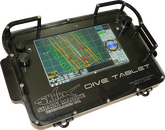I think, in this instance, it would be good to practise using a compass on dry land before trying to take it underwater might be a good idea. It is a lot easier to communicate the principles vocally that to try to do so with hand signals underwater. The basics are the same so getting a bit more comfortable with bearings , sightings etc on land will help reduce the task loading underwater considerably.Thank you all for your Opinions. She has never used a Compass before, so a big one might be nice to have for the class. Maybe we will get a dive in this week and stop by a shop in Ft Lauderdale.
You are using an out of date browser. It may not display this or other websites correctly.
You should upgrade or use an alternative browser.
You should upgrade or use an alternative browser.
Compass for PADI AOW
- Thread starter MikadoWu
- Start date
Please register or login
Welcome to ScubaBoard, the world's largest scuba diving community. Registration is not required to read the forums, but we encourage you to join. Joining has its benefits and enables you to participate in the discussions.
Benefits of registering include
- Ability to post and comment on topics and discussions.
- A Free photo gallery to share your dive photos with the world.
- You can make this box go away
This is not only a good idea, it is actually suggested by PADI as part of the pre-dive preparation for the AOW navigation dive.I think, in this instance, it would be good to practise using a compass on dry land before trying to take it underwater might be a good idea. It is a lot easier to communicate the principles vocally that to try to do so with hand signals underwater. The basics are the same so getting a bit more comfortable with bearings , sightings etc on land will help reduce the task loading underwater considerably.
What Neilwood and Tursiops said are spot on. If she has never used a compass before, trying to learn how to use one underwater with all the other things that are going on, is foolish at best. That is a skill that can, and should be, perfected on land before trying to use one under water. It is much easier to visualize the "plan" and practice orienting when you are not trying to maintain buoyancy, etc., and if you mess up the plan, you can just walk back to your start point, analyze and discuss what went wrong and start over. Using a compass is not hard, but it does require a very good understanding of the basics, and then repetitive practice until geting around a course becomes second nature.
scuba5150
Contributor
My AOW instructor recommended the Suunto compass for $65 and it's great. I've been using it ever since.
Fossil_Diver
Contributor
This is total overkill but I still want one lol. For practicality I like a wrist mounted compass. But if I ever win the lottery...
http://www.sharkmarine.com/Products/HandHeld/DiveTablet.html
http://www.sharkmarine.com/Products/HandHeld/DiveTablet.html
Attachments
iluvtheocean
Contributor
I dislike having to switch between compass and regular mode as well as accuracy. wrist mount compass better and no need calibration.
Similar threads
- Replies
- 30
- Views
- 2,247
- Replies
- 4
- Views
- 180
- Replies
- 62
- Views
- 5,281





